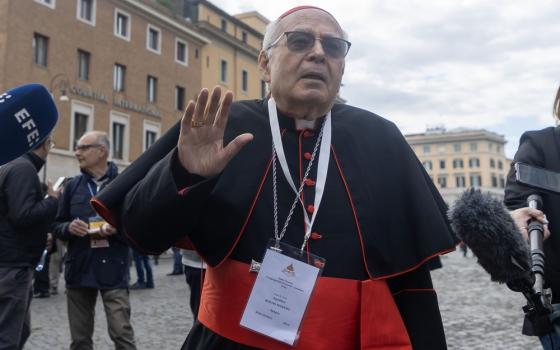One of the most helpful side effects of the Synod Follies presided over by, among others, Cardinal Raymond Burke is a distinction that he does not apparently grasp but that is crucial for our understanding of the reflections of that body and the leadership of Pope Francis.
Burke, like the famous Little League bully who threatens to take his ball and bat and go home, is highly exercised at such synodal deliberations as those that offer understanding and hospitality to homosexuals. He recently described the church under Pope Francis as a ship without a rudder.
Always at a low boil, the cardinal -- and other critics of what we might call the synod's offer of pastoral comfort to gays and couples cohabiting without being married -- overflows in stinging streams of indignation that Francis should make even standing room for sinners in the sanctuary. Religion should be harsh, demanding, and a source of punishment rather than a place of understanding and forgiveness.
Perhaps that is why, in several interviews about his work in recent years as the head of church courts, he describes the unhappiness that petitioners have had to experience at the coolness, if not dramatic disappointment, they have had to suffer in seeking justice in these Vatican venues.
Burke, no doubt pleased with the medieval sound of his new role as ecclesiastical overseer for the Knights of Malta, will use his sudden free time to rally those who think that Catholicism, as writer Jimmy Breslin once expressed it to me, should be "the Marine Corps of churches" -- in other words, a church where you do what you are told, you do not think for yourself, and you fit in or get out.
We know, of course, that Jesus was criticized for being at ease with sinners, even dining with them. Putting that aside for the moment, what we grasp about Burke's idea of religion is that it is directed toward the will, that faculty so central to the exercise of true belief that it could be put on the cover of Men's Health along with abs and pectoral muscles.
Religion, however, is not aimed at toughening the will to use it against oneself in the daily grim (at least to Burke) battle of life. That makes religion a negative force, a suppressant to every human impulse, a marching order for those who think believing demands they forsake all that is human and leaves little room for the spontaneous possibilities of love and forgiveness. The latter go together all the time in anybody who lives, as St. John expresses it, "life to the full."
The object of religion is the imagination, that deep and inexhaustible font of our understanding and symbolizing our deepest possibilities. St. Pope John XXIII called for the Second Vatican Council because he understood, as no Holy Father had in a long time, religion spoke to and found its language and symbols -- its entire sense of the sacramental nature of existence -- in the imagination that reveals not just the penalties of living, but the wonder and awe of our existence.
Those like Burke are convinced that religion consists mainly in saying "no" to yourself, living in fear of sinning even accidentally and in dread of getting God mad at you if you ever chose the spirit over the law. Religion of this sort may produce temporary relief with confession, but it denies to ordinary people the deep joy, the showers of wonder, that religion can and should provide to them.
Critics of Vatican II often say that it turned the church soft when actually it revealed its humanity. They apparently feel more religious if they bend their will and are reassured if they feel guilty most of the time. Critics of Pope Francis are afraid that he is relaxing religion when he should be tightening its strictures and making us feel like people waiting for the jury to come in every day at high noon.
Pope Francis understands that faith should quicken our imaginations and make us aware of the God who loves us as a father and does not look down on us a judge. That is why he is able to speak spontaneously almost every day of the riches of faith available to us all the time. Religion allows the imagination to support, strengthen, and open us to the joy of life every day.
As for Cardinal Burke, presumably he enjoys being miserable every day. That's OK for you, Cardinal, but leave the rest of us to the happiness that religion helps us to find even in the hard times you relish so.
[Eugene Cullen Kennedy is emeritus professor of psychology at Loyola University Chicago.]
Editor's note: We can send you an email alert every time Eugene Cullen Kennedy's column, Bulletins from the Human Side, is posted. Go to this page and follow directions: Email alert sign-up.






